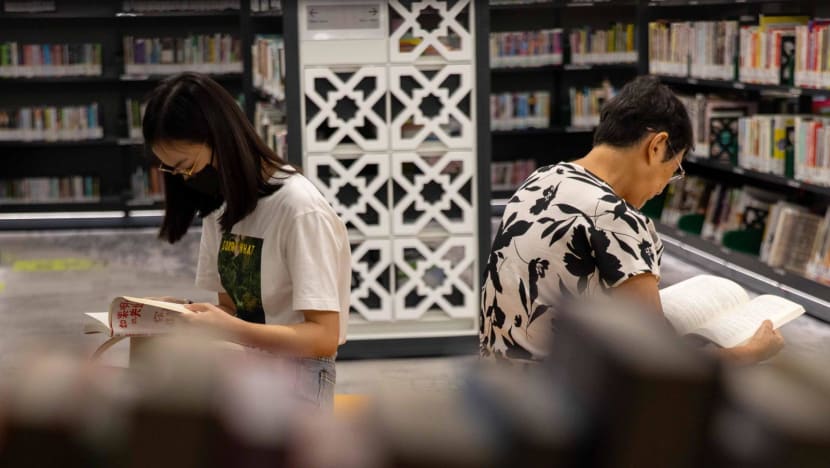Commentary: If bookstores cease to exist in Singapore, would most of us care?
It may not be practical to purchase every book we wish to read, but we can support the literary ecosystem in small but meaningful ways, says author Vivian Teo.

Both public libraries and commercial bookstores are essential to preserving Singapore's reading culture. (Illustration: CNA/Rafa Estrada)

This audio is generated by an AI tool.
SINGAPORE: It’s pretty obvious – bookstores in Singapore are on the decline. Kinokuniya Singapore recently downsized its flagship store at Takashimaya shopping centre, after closing outlets at Jem in 2022 and Liang Court in 2019. Homegrown publisher Epigram Books shuttered its only physical store operations earlier this year. Times Bookstores closed its last outlet at Holland Road in 2024.
When news breaks of a bookstore's closure, social media often lights up with expressions of sadness and nostalgia. But how representative are these reactions of the broader Singapore public? Do most people genuinely care about the fate of bookstores or just a vocal minority of passionate readers?
Perhaps the issue lies deeper: Are we just not a nation of readers who can keep bookstores thriving?
A study by the Organisation for Economic Co-operation and Development (OECD) highlighted that Singapore’s adult literacy proficiency falls below the OECD average.
Notably, literacy among Singaporean adults declines sharply after the age of 35, and continues trending downward as they grow older. This contrasts starkly with the performance of Singapore’s 15-year-olds, who topped the OECD's Programme for International Student Assessment (PISA) 2022 on reading. The data suggests that literacy skills gained during schooling diminishes over time for many Singaporeans.

SINGAPORE’S EXCELLENT PUBLIC LIBRARIES
For those who do read, the incentive to purchase physical books have waned, driven by a growing shift towards digital formats like e-books and audiobooks.
Perhaps the other part of the challenge is that Singapore’s libraries are just that good, driving our preference for borrowing rather than buying books. In 2023, 36.3 million physical and digital books were loaned, according to the National Library Board.
Public libraries are highly accessible, with many located in shopping malls near MRT stations, and offer a wide selection of local and international titles. A visit to the library on a weekend often reveals bustling children’s sections.
As an avid reader with a family of book lovers, I can understand this choice: Libraries have been invaluable in saving both money and shelf space.
Some might argue that traditional bookstores are unsustainable in an increasingly digital world and that Singapore's excellent libraries can equally nurture a love for reading.
Yet, this creates a paradox. If everyone relies solely on borrowing, the book industry suffers. Publishers, authors and booksellers primarily earn from book sales. And in Singapore where public lending rights are not in place unlike other countries, creators receive no compensation for library loans beyond the initial copies sold to libraries.
HELPING LOCAL BOOKS STAND OUT
What many fail to appreciate is that the book industry operates as an interconnected ecosystem.
Over the past five years, I’ve published six children’s books, and I can attest that writing a book and getting it into readers’ hands isn’t easy.
Few see the labour-intensive process: Authors pour countless hours into crafting stories, followed by even more time revising and refining. Bringing life to words then requires others like editors, designers and illustrators. After publication, the work continues with marketing, distribution and sales to ensure the book reaches its audience.
Purchasing a book directly supports the many people involved in the book-making process. This is especially significant for local writers striving to make their voices heard.
Without sufficient sales, authors and publishers are unable to produce new works. Authors would not be able to continue writing as it becomes an unsustainable career, while publishers may become more risk-averse, focusing only on projects they know will sell, instead of taking chances on more diverse or creative works. This ultimately impacts the quality and diversity of books available – even for those who rely on libraries.
Bookstores that highlight and recommend Singapore literature have played a vital role in helping my books stand out amid the sea of foreign titles that dominate shelves. Without bookstores, it would be tougher for authors to sustain their craft and for publishers to take a chance on new talent.
AN ADDED CHARM
Physical bookstores offer much more than access to books. They host book launches, readings and author meet-and-greets, transforming into lively spaces brimming with ideas, creativity and meaningful conversations. While libraries also serve as community spaces, bookstores bring an added layer of charm, energy and intimacy.
As an author, it’s always wonderful to connect with readers at events. Children often ask me about writing, share their dreams of becoming authors, and frequently leave inspired, picking up other books along the way. I’ve also participated in bookstore events as a reader, engaging with fellow attendees in interesting conversations and often leaving with book recommendations from bookstore owners.
Independent bookstores in Singapore, in particular, play a special role by offering homegrown authors a platform to shine. They contribute to the growth of the local literary scene, inspiring the next generation of writers and fostering a sense of pride in Singapore's storytelling heritage.
In a world dominated by digital content, bookstores remain magical places. They are not just shops; they are vibrant intersections of stories, people, and communities.
HELPING BOOKSTORES THRIVE
Various suggestions from the book community have been proposed to help Singapore bookstores thrive. There are calls for ideas such as rental subsidies, tax breaks, Goods and Services Tax (GST) exemptions to be explored. Singapore is in a minority of countries that charges the standard GST rate for printed books, according to a 2018 International Publishers Association report.
Supporting a commercial bookstore with taxpayer money might seem counterintuitive, but the benefits to the public – such as fostering a strong reading culture, encouraging lifelong learning and boosting the local creative scene – can far outweigh the cost. It’s an investment in a country’s cultural ecosystem that enhances the community's quality of life, which everyone can benefit from in the long run.
Declining bookstores is a global phenomenon but governments, including those in Japan, China and Taiwan - which have thriving public libraries too - are providing subsidies and launching initiatives like collaborations with libraries to help bookstores survive.
In China, industry experts noted that the government’s series of supportive measures for physical bookstores have revitalised the sector, encouraging bookstores to innovate and achieve sustainable growth.
A friend of mine has also suggested bookstores venturing into the e-book market. Currently, readers in Singapore primarily purchase e-books through online platforms, often non-local ones. But what if local bookstores found a way to sell e-books directly? This presents an opportunity worth exploring for bookstores and e-book publishers alike.
From a consumer perspective, while it may not be practical to purchase every book we wish to read, we can support the ecosystem in small but meaningful ways. We can continue borrowing from libraries while occasionally buying books, like those by our favourite authors, books with beautiful covers and illustrations we can keep as art, books our children like to reread or titles we’ve borrowed from the library and fallen in love with.
Ultimately, both libraries and bookstores are essential to preserving Singapore's reading culture: Libraries inspire and nurture a love for reading, while bookstores sustain the literary ecosystem by supporting authors, publishers and the production of new works. To allow bookstores to vanish would be to lose an essential pillar of Singapore’s cultural and intellectual heritage.
Vivian Teo is a freelance writer, children’s book author and owner of a parenting and lifestyle blog.



















